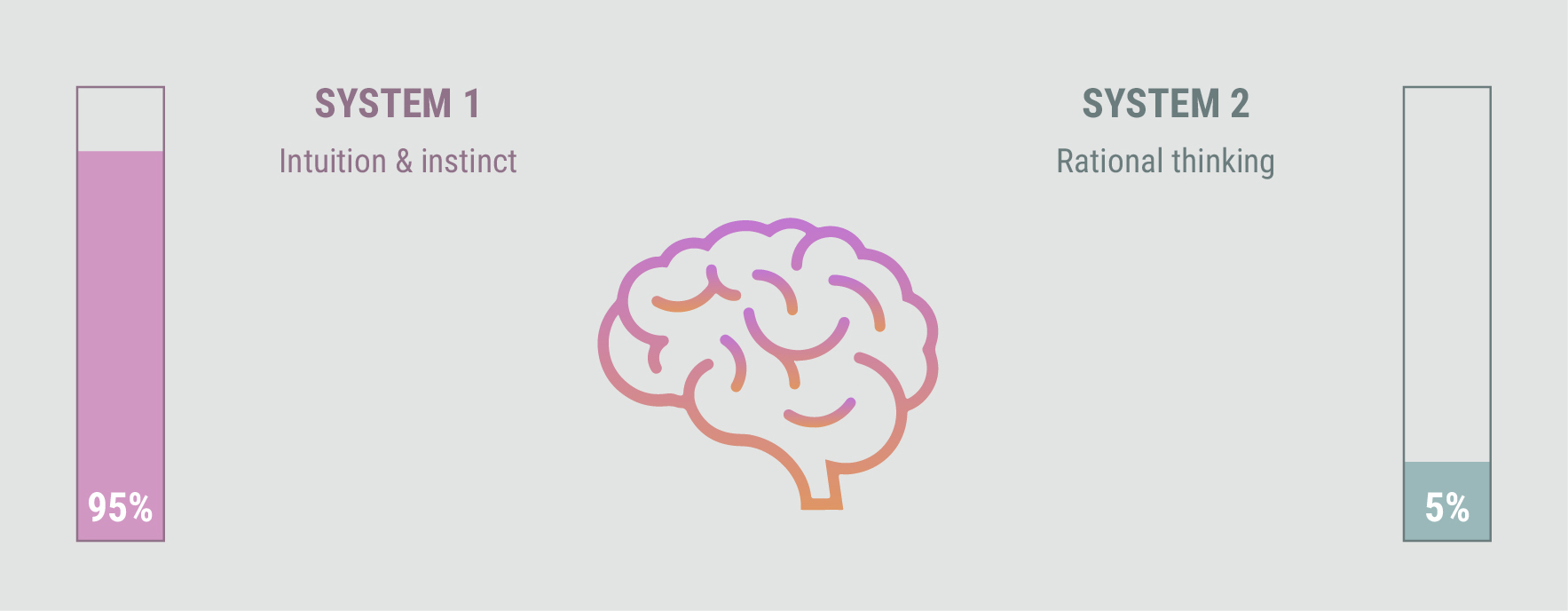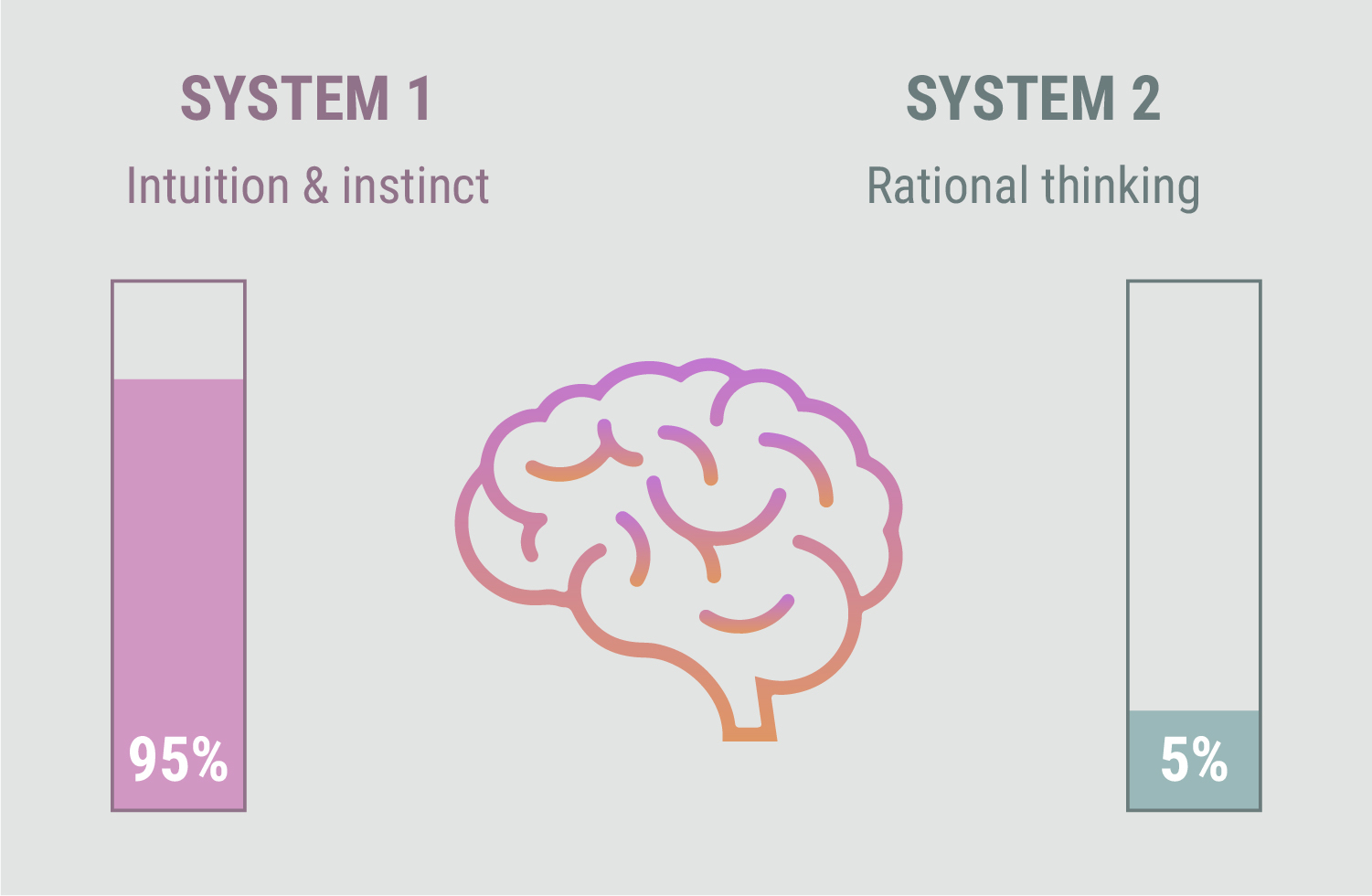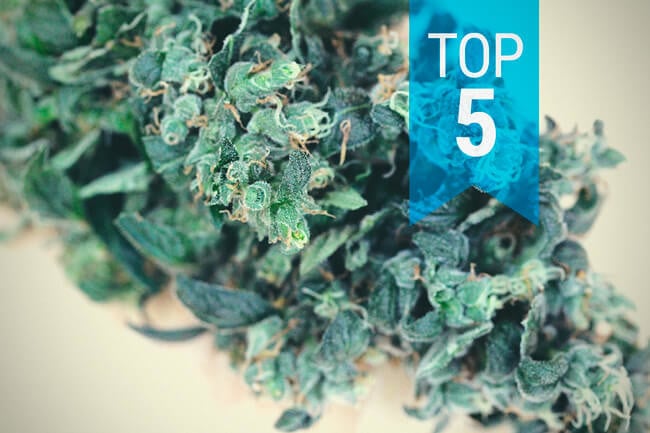.

How Does Cannabis Impact Memory?
Does smoking weed affect your memory? This is one of the most important questions we can ask, as our memory is incredibly important. The short answer is yes. But acknowledging that opens the door to using cannabis is a way that minimises the negative effects. Below, we explore the short and long-term impact of weed on memory.
Contents:
It’s no secret that smoking weed causes short-term memory impairment. But what’s going on when this happens? Does weed mess up your memory for good? Using cannabis in a healthy, fulfilling way requires an understanding of its unfavourable effects, as it better allows users to mitigate them.
In this article, we examine how cannabis affects memory in both the short term and the long term, so you can enjoy its benefits while being informed of its risks.
How Memory Works
Simply put, cognition can be described as a dual process consisting of two systems.
- System 1 is the realm of the unconscious; of automatic, simple decisions, and of speed.
- System 2, on the other hand, is the realm of consciousness—the system in which you probably feel you reside. System 2 tackles complex decisions that need to be actively thought about. It is slower, but more reliable.
Memory relies on these two systems, but we could say that memories “live” in system 2. We form memories best through conscious interaction with the world (attention), which then affects our short-term memory.
Usually, short-term memories will become forever lost unless they are rehearsed. This rehearsal can either be internal and conscious or an external repetition. Rehearsal will eventually move things into the long-term memory category, where they will remain indefinitely, and can be accessed at any time.


The Link Between Cognitive Function and Cannabis
Understanding cannabis’ effects on cognitive function has proven an incredibly difficult undertaking. Not least of all because cannabis is made up of over 100 different cannabinoids, and we only really understand THC and CBD (and even there we’re sorely lacking). What’s more, concentrations of these cannabinoids within the cannabis plant can vary dramatically—so it’s not possible to make generalised claims about how cannabis affects memory.
However, as most cannabis varieties contain THC, what we can do is make tentative judgements about the effects of this psychotropic cannabinoid specifically. Moreover, as breeding has developed, we are also beginning to understand CBD’s role too.
All cannabinoids interface with the body’s endocannabinoid system (ECS) to some degree. This physiological network of receptors and channels is naturally triggered by the body’s own endocannabinoids—such as anandamide.
The cannabinoids found in cannabis can also interact with the ECS, either directly (THC) or indirectly (CBD). The ECS affects almost all of the body's functions, including dopamine release, reward, and learning—and thus, memory.
The Short-Term Effects of Cannabis on Memory
Anyone who uses cannabis regularly is aware that it impacts short-term memory. Whether that’s forgetting what you just said, forgetting what’s been said to you, or getting halfway through a paragraph and forgetting how it started, the effects of cannabis on short-term memory are easy to perceive.
But why exactly does this happen? A 2021 study by Kroon, Kuhns, and Cousijn will be used as the main source for this article, comparing it with others where necessary.[1]
Motor Memory
Cannabis intoxication appears to reduce motor inhibition—that is, someone's ability to halt an ongoing motor task. This was tested with what’s known as a stop-signal task. Participants had to begin a motor action on one signal, and then stop it on another signal. The time difference between the stop signal and the inhibition of the motor action is then measured, quantifying motor memory.
In those under cannabis intoxication, this time was significantly longer than in those who were not. In contrast to this, inhibition before a response is initiated may not be impaired.[2]
These findings are statistically significant, but the researchers admit they require further scrutiny. Nevertheless, it looks as though cannabis may have a detrimental effect on at least some forms of motor memory.
Learning and Memory
When it comes to the adverse effects of cannabis on learning and memory, the findings seem to indicate a clear correlation. Perhaps unsurprisingly, results were dose dependent, with more cannabis equalling poorer recall.
What’s interesting, though, is that although it was shown that cannabis consumption does negatively affect this form of short-term memory, it remains unclear whether long-term use compounds the effects or not. It may be that short-term memory is affected equally in the first-time user and the lifelong cannabis user. That’s not to say this is the case, though.
A study working with adolescents discovered that immediate recall, but not delayed recall, appears to be inhibited by cannabis consumption[3]. In opposition to the above study, this one found that continued use did in fact correlate with worsening immediate recall. Now, what’s worth noting here is that this study focused on adolescents, on whom cannabis has long been known to affect more adversely than adults.


Working Memory
This is also related to short-term memory. It means, literally, the ability to process information in real time. It is used when you are learning something, and it helps you build connections. It’s your ability to hold a train of thought and further process it.
Findings are inconsistent regarding cannabis’ effects on working memory, especially regarding long-term use. However, it does seem likely that cannabis intoxication does have an adverse effect on working memory.
One study found that in participants who were cannabis users, only those with THC detectable in urine samples saw a significant decline in working memory ability[4]. THC is only present in urine for a relatively short time after smoking, implying that its impact on working memory is linked to immediate effects, rather than long-term.
Verbal Memory
Both verbal and non-verbal memory are negatively impacted by cannabis consumption. In practice, this is one of the most observable effects of people who have recently smoked weed. It’s not uncommon to find yourself or someone struggling to keep track of a conversation. These types of memory are inextricably linked with immediate recall.
That said, one study that followed 3,300 individuals for 25 years found this: users lost about one word for every five years of marijuana they had smoked[5]. Nevertheless, these findings should not be conflated with short-term memory effects, even though they relate to verbal memory.
Emotional Memory
The short-term effects of cannabis consumption on emotional processing appear to be minimal but present. It has been found that, on the whole, emotional processing is unimpeded by cannabis intoxication, except in regard to recognising and remembering negative emotional cues[6]. A person’s ability to recognise negative emotions seems to be hampered by cannabis consumption (though not dramatically).
Interestingly, a further study discovered significant sex differences in emotional processing, thought to be impacted by the residual effects of cannabis[7]. This highlights the need for further, more rigorous studies into cannabis and its effects not just in general, but in more specific demographics.


Spatial Memory
Spatial memory is the ability to remember details in the immediate environment. In other words, it’s what allows one to easily recall the last location of their keys, or find one’s way out of a maze. This kind of memory is also affected by cannabis.
A 2014 study found that THC can drastically and negatively affect spatial memory[8]. In the 1990s, this was also tested in mice. Those who had recently ingested THC had a harder time finding their way out of mazes.
Attention
Attention in itself is not a form of memory, but memory is entirely reliant on attention. Understanding the negative effects of weed on short-term memory may not be possible without first understanding its effects on attention.
Attentional control has been found to be inhibited by both immediate cannabis use—with inhibition increasing in a dose-dependent manner—and long-term use. It is possible that this goes a long way to explain why short-term memory is negatively impacted by cannabis consumption. If you can’t pay attention to something, you’re probably not going to remember it.


The Long-Term Effects of Cannabis on Memory
Much as the effects of long-term cannabis use on memory are poorly understood, so are the effects of cannabis on long-term memory. However, it seems long-term memory is much more robust in the face of cannabis consumption compared to short-term.[9] Once a memory has become embedded, retrieval appears to be fairly secure.
However, if you’re consistently impacting your short-term memory, you won’t have many new memories entering your long-term memory anyway, so there won’t be much to retrieve.
That said, the effects of long-term cannabis use are far harder to pin down. Controlling for other factors becomes much harder over decades, as does assessing what “cannabis use" actually means. Two people may have been smoking for 20 years, but how much do they smoke a day, and what cannabis have they been smoking?
What is apparent, though, is that if cannabis affects short-term memory, this could have long-term effects. If you smoke everyday for 20 years, you are likely to negatively affect your short-term memory during this time, and there will therefore be indirect long-term effects.
However, some good news. Abstinence from cannabis appears to allow your brain to repair itself. It’s not entirely clear whether this recovery is partial or total, nor how long it takes. But if you feel you’ve done some damage, things can get better.
The Long-Term Effects of Adolescent Cannabis Use on Memory
The negative effects of cannabis on memory appear to be more profound in the case of early onset use. It is well-known that using cannabis while the brain is developing can have extraordinarily negative effects, and ones that may be much harder to reverse.
And as they happen while the brain is developing, they can become cemented in a way that may not happen in an adult brain. Therefore, if you’re young, stay away.
What About CBD and Memory?
Can constituents like CBD improve memory function[10]? Or does CBD cause memory loss?
The ability of CBD to activate some eCBome[11] sites raises the question of whether the cannabinoid could help to quell inflammatory cascades and reduce memory impairment[12] in these circumstances.
Like THC and other cannabinoids, CBD (or cannabidiol) exists in raw cannabis as a cannabinoid acid (CBDA) following the enzymatic transformation of its precursor CBGA. As a meroterpene (part phenol, part terpene) CBDA plays a protective role in plant physiology. When exposed to high temperatures, decarboxylation transforms CBDA into the better-known molecule CBD. This non-psychotropic molecule has a scattershot mechanism of action in the body. Far from honing in on one molecular target, CBD interfaces with a range of receptors[13], including:
- CB1 (inverse agonist, antagonist, negative allosteric modulator)
- CB2 (inverse agonist, antagonist, negative allosteric modulator)
- GPR55 (antagonist)
- TPPA1 (agonist)
- TRPV1 (agonist)
- 5HT1A serotonin receptor (indirect agonist)
- PPARy (agonist)
CBD also influences many other receptors that make up the eCBome. As you can imagine, this widespread mechanism of action makes cannabidiol a good research candidate for a host of clinical applications. Let’s find out how, through interacting with some of these receptors, CBD may impact elements of memory.
Memory Loss
Does CBD cause memory loss? Or can it help to reduce it? When it comes to using cannabis, taking CBD alongside THC might help to mitigate the effects of THC on short-term memory. Researchers are exploring if blends of both molecules may result in reductions in memory impairment[14] compared to THC alone.
Ongoing studies are also assessing the impact of CBD on overall human brain function. Researchers from Utrecht University in the Netherlands performed a systematic review[15] to analise the acute effects of CBD on emotional processing, verbal memory, and auditory and visual processing. Studies included in the review involved both healthy participants and subjects with psychiatric disorders.
Adding to the amassing research in this area, a paper published in the Journal of Psychiatric Research documents a study that looked at the effect of CBD[16] on verbal episodic memory in healthy young participants.
As well as improving memory, researchers are keen to find out if CBD can block distressing memories, such as those that characterise PTSD. Whereas the process of reconsolidation helps to strengthen memory, reconsolidation blockers help to impair this process and weaken memory traces. Research[17] published in the journal Neuropsychopharmacology looked at the ability of CBD to disrupt both 1 and 7-day-old memories when administered to rats.


Cognitive Disorders
Several neurodegenerative diseases result in memory loss, including dementia and mild cognitive impairment (MCI). Neuroinflammation presents as a common feature[18] in dementia. Ongoing studies are currently testing CBD for anti-inflammatory[19] and neuroprotective properties[20]. Researchers are also assessing CBD for memory-rescuing[21] effects in animal models of cognitive impairment caused by neurodegenerative diseases. Scientists in Australia have also tested the long-term administration of CBD against the development of social recognition memory deficits[22] in an animal model of Alzheimer’s disease.
THC vs CBD for Memory
THC and CBD have different mechanisms of action in the body. Both target a wealth of eCBome receptors, however, one of the key differences lies in how they interact with CB1. While CBD has a low affinity for the site, THC acts as a parietal agonist, meaning it raises the level of activation above baseline. In doing so, the molecule causes an acute surge in dopamine and the subsequent sensations of the cannabis high.
But which cannabinoid should you pick before, say, sitting through an exam or soldering through an important textbook? Well, THC alone might provide adequate motivation and insight, but it produces a well-recognised inhibition of short-term memory. In contrast, ongoing studies are looking to see if CBD enhances memory and helps to curb the detrimental effects of THC.
Is Cannabis a Help or a Hindrance to Memory?
While we have a long way to go in understanding the relationship between cannabis and memory, it seems that if the former has any effect at all on the latter, it’s likely to be negative or negligible. We especially need more information regarding long-term use.
As things stand, we know that cannabis intoxication does seem to cause short-term memory impairment. However, this in isolation need be no bad thing. In recognising how cannabis affects memory, we have a greater ability to make informed choices about when to take it, and when to abstain.
Furthermore, as evidence suggests the negative effects of “cannabis memory loss” are mostly reversible with abstinence, we have the ability to undo any harm we feel we may have done.
- The short-term and long-term effects of cannabis on cognition: recent advances in the field - PubMed https://pubmed.ncbi.nlm.nih.gov
- Effects of THC on Behavioral Measures of Impulsivity in Humans | Neuropsychopharmacology https://www.nature.com
- Adolescent cannabis use and its associations with decision-making and episodic memory: Preliminary results from a longitudinal study - PubMed https://pubmed.ncbi.nlm.nih.gov
- Urinary tetrahydrocannabinol is associated with poorer working memory performance and alterations in associated brain activity - PubMed https://pubmed.ncbi.nlm.nih.gov
- Long-term Marijuana Use and Cognitive Impairment in Middle Age | Adolescent Medicine | JAMA Internal Medicine | JAMA Network https://jamanetwork.com
- Acute effects of delta-9-tetrahydrocannabinol, cannabidiol and their combination on facial emotion recognition: a randomised, double-blind, placebo-controlled study in cannabis users - PubMed https://pubmed.ncbi.nlm.nih.gov
- An Event-Related Potential Study on the Effects of Cannabis on Emotion Processing | PLOS ONE https://journals.plos.org
- Acute administration of THC impairs spatial but not associative memory function in zebrafish - PubMed https://pubmed.ncbi.nlm.nih.gov
- The effect of cannabis use on memory function: an update - PubMed https://pubmed.ncbi.nlm.nih.gov
- Memory-rescuing effects of cannabidiol in an animal model of cognitive impairment relevant to neurodegenerative disorders | SpringerLink https://link.springer.com
- CB1 receptors in the formation of the different phases of memory-related processes in the inhibitory avoidance test in mice - PubMed","https://www.ncbi.nlm.nih.gov/pmc/articles/PMC3124778/ https://pubmed.ncbi.nlm.nih.gov
- The endocannabinoidome as a substrate for noneuphoric phytocannabinoid action and gut microbiome dysfunction in neuropsychiatric disorders - PMC https://www.ncbi.nlm.nih.gov
- Mutual Links between the Endocannabinoidome and the Gut Microbiome, with Special Reference to Companion Animals: A Nutritional Viewpoint - PMC https://www.ncbi.nlm.nih.gov
- https://onlinelibrary.wiley.com/doi/full/10.1111/bcpt.13710
- Acute effects of naturalistic THC vs. CBD use on recognition memory: a preliminary study | Journal of Cannabis Research | Full Text https://jcannabisresearch.biomedcentral.com
- https://www.sciencedirect.com/science/article/pii/S002239562100546X
- On Disruption of Fear Memory by Reconsolidation Blockade: Evidence from Cannabidiol Treatment | Neuropsychopharmacology","https://pubmed.ncbi.nlm.nih.gov/25716012/ https://www.nature.com
- Antioxidative and Anti-Inflammatory Properties of Cannabidiol - PMC https://www.ncbi.nlm.nih.gov
- Review of the neurological benefits of phytocannabinoids - PMC https://www.ncbi.nlm.nih.gov
- Memory-rescuing effects of cannabidiol in an animal model of cognitive impairment relevant to neurodegenerative disorders | SpringerLink https://link.springer.com
- Long-Term Cannabidiol Treatment Prevents the Development of Social Recognition Memory Deficits in Alzheimer's Disease Transgenic Mice - IOS Press https://content.iospress.com






































